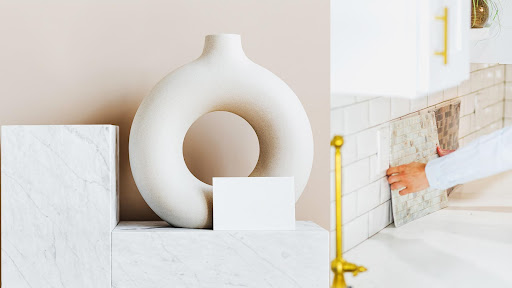Porcelain slabs are heat, UV, and scratch-resistant, which means it’s incredibly durable. They are also currently becoming a more and more popular option for countertops, cladding, and flooring in both indoor and outdoor applications.
When compared to more conventional materials like turf or genuine stone paving, porcelain has a number of enticing advantages. But are there any drawbacks?
Here at GoldMe, we made a list of the pros and cons of porcelain slabs which we hope will assist you in deciding whether or not to purchase porcelain slabs for your next build.
PROS
- Strength and Durability
- As previously stated, porcelain slabs are substantially more durable. In addition to being scratch-resistant, porcelain slabs are also resistant to fire, high temperature, pressure, and shock. Without having to be concerned about your knives scratching the surface, you can even slice and dice food right on it.
- Low Water Absorption
- One of the main advantages of porcelain slabs is their low water absorption. Since porcelain is significantly less absorbent than natural stone pavers, they are significantly more resistant to damage from moisture, stains, etc.
- Easy Maintenance
- Porcelain slabs require almost no maintenance due to their low water absorption and exceptional durability. Most importantly, Goldme products don't require sealing; a yearly wash will keep them in top condition.
- Eco-friendly
- The environmental friendliness of porcelain is one of its main advantages. It's good to know that one day you'll be able to recycle it because it's a wholly natural product made of unprocessed and clay-based materials.
- Patterns and Colors
- Thanks to the use of natural pigments, GoldMe offers a wide range of color options for your porcelain slabs. Patterns and colors can be added during the fabrication process since porcelain is an engineered stone. Your porcelain slabs can be made to resemble any material, such as marble, wood grain, concrete finishes, or rusted steel, and they will still look very natural.
- Size and Thickness
- Porcelain slabs are very light materials with a variety of installation options. Additionally, extra-large porcelain slabs can be produced, requiring fewer seams overall. This makes the material a good option if you want to give your kitchen island a single slab cover look.
- Quick installation
- Thanks to GoldMe’s revolutionary pedestal support system, porcelain slabs are now easier to install. Thick porcelain slabs can be quickly installed in your home without any cement or adhesive whatsoever.
CONS
- Easy to Crack
- Porcelain slabs have a few drawbacks. One is that it will break if it is struck bluntly. It's robust but not overly so. It will be fine as long as you don't use a hammer or a meat cleaver on it.
- Hard to Cut
- Porcelain slabs are harder and more challenging to cut compared to other paving materials. It is possible, but specialized cutting tools might be needed. In connection with that, if an installer hasn't worked with porcelain much, they might be hesitant to do so.
- High Cost
- Depending on the quality of the product you're purchasing, porcelain paving prices can vary greatly, but on average, porcelain is more expensive than other paving materials. But keep in mind that the initial cost is only a portion of the picture; compare warranty duration, maintenance needs, and other important performance indicators.
Making a decision ultimately comes down to your aesthetic preferences, functional requirements, and financial constraints. If you're still not sure whether porcelain slabs are the right choice for your indoor and outdoor living space, help is at hand - you can check samples from GoldMe right now!
Here at GoldMe, we sincerely hope this list helps you in making the right decision. We wish you good luck, happy shopping!
